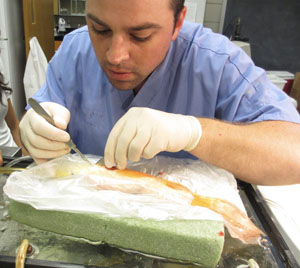American Board of Veterinary Specialities seeks comments through Sept. 2
Johnny Shelley

Photo courtesy of Dr. Johnny Shelley
Dr. Johnny Shelley says schools are responding to the growing popularity of fish medicine by adding aquatic medicine courses. He entered the field in 2012, taking on an externship at the Louisiana Aquatic Diagnostic Disease Laboratory at Louisiana State University School of Veterinary Medicine.
More veterinarians than ever practice fish medicine in zoos, aquariums or commercial aquaculture, treat pets in private practice or oversee fish farms for government agencies. Yet much of the industry fails to recognize the value of hiring fish veterinarians.
Adding fish practice to the list of recognized veterinary specialties within the American Board of Veterinary Practitioners could advance the field and help elevate its status.
That's the gist of a proposal submitted to the American Board of Veterinary Specialties, a governing body of the American Veterinary Medical Association that recognizes nearly 50 distinct specialties and half as many specialty organizations, including ABVP. To date, more than 16,500 veterinarians have been board-certified in one or more areas of study, earning diplomate status after completing postgraduate training, education and passing an examination.
Dr. Johnny Shelley, a veterinary medical officer with the National Oceanic and Atmospheric Administration, wants diplomate status for himself and his colleagues. Specialty recognition, he said, could help popularize a field that counts on veterinarians to improve biosecurity, welfare, production practices in various fish industries and at the same time, care for pet fish.
"Aquarium fish are the most numerous of all pet groups among households, and their owners are increasingly seeking our care," Shelley said. "The American Association of Fish Veterinarians gets emails all the time from owners who can't find a veterinarian dedicated to fish in their area."
Shelley helps field such inquiries as immediate past president of the association, which teamed with the World Aquatic Veterinary Medical Association to create the proposal for an AVBP fish practice specialty.
Veterinarians, Shelley said, want the option to specialize in this area of practice: "We sent out a survey in 2021, and had 147 respondents. Seventy-five percent said they were interested in pursuing board certification, and a majority said that if given the chance, they would apply, either immediately or within one to two years."
Whether that option becomes reality is up to the ABVS. The board is soliciting comment through Sept. 2, inviting the public to submit thoughts on whether an ABVP fish practice specialty would be sufficiently distinct from others already recognized, and whether it's wanted or needed.
Comments emailed to ABVS@avma.org should include the subject line "Fish practice public comment."
The proposed specialty, Shelley said, is nearly a decade in the making. The idea has circulated since 2013, when AAFV made its first attempt to garner specialty recognition. Though the ABVP was supportive, some in the profession doubted that interest in the field could sustain a revolving number of applicants needed to maintain the specialty.
Much has changed since then. While residencies for fish medicine still do not exist, veterinary schools are beginning to recognize the growing importance of fish medicine by increasingly adding fish-focused courses or creating established aquatic veterinary programs. "The University of Florida, for example, has an established certification program," Shelley said.
Interest has grown elsewhere, too. The Certified Aquatic Veterinarian Program, offered by the World Aquatic Veterinary Medical Association, has averaged roughly 30% annual growth in applicants during the past five years, Shelley said, and the organization offers a student chapter program for aspiring veterinarians interested in aquatic practice.
Following the close of the comment period, ABVS will present feedback to Shelley and others in the ABVP Fish Practice Organizing Committee, and may ask for changes to the proposal. The ABVS, which currently recognizes 46 specialties and 22 specialty organizations, is expected to make a decision when the board's 12 voting members meet in November.
The ABVS also is considering whether to grant specialty status to education.
Update: The ABVS granted provisional recognition of fish practice as a specialty in 2023. Separately, an application for an education specialty was withdrawn by proponents.